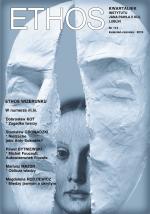Michel Foucault. Autowizerunek filozofa
Michel Foucault: Self-Image of the Philosopher
Author(s): Pawel BytniewskiSubject(s): Philosophy, Philosophical Traditions, Social Philosophy, Special Branches of Philosophy
Published by: Katolicki Uniwersytet Lubelski Jana Pawła II - Instytut Jana Pawła II, Wydział Filozofii
Keywords: Michel Foucault; philosopher’s image; sense of self-discovery; critique; creativity; act of thought
Summary/Abstract: Creation of images of the philosopher by philosophers is one of the oldest ways to problematize philosophy. In depictions of this sort we can find both a concept of philosophizing and a concept of the place which is occupied by philosophy in the intellectual culture, as well as the pattern of its participation in the wider context of the reality of social life. This is why philosophers for various reasons create images of the philosopher and attribute diverse roles to them, both in philosophy and outside it. Thus, they are images-experiences and images of projects, images-criticisms and images confessions, images-thoughts and images-incentives. The answer to the question: ‘What is philosophy?’ intertwines in them with the belief that philosophy should actively participate in life. What is the originality of the Foucault’s problematization of these issues? A consistent answer to this question does not exist, at least there is no answer that would render a single image of Foucault, a philosopher. In Foucault’s writings, as well as in the various statements he made, one may observe intricate strategies of evasion and open battle, the belief that every alien but informative idea is a challenge, a pursuit of ascetic forms of style combined with a penchant for Baroque literary forms à la Jorge Louis Borges or Raymond Roussel. However, even these do not exhaust all the contrasts and complexities characteristic of Foucault’s output. How can an act of thought become a self-discovery? How can an act of writing change one’s way of being? In his answers to these questions Foucault always wants to be a step ahead of his commentators, whether they are his adherents or his opponents. He wishes to grant himself the privilege of being the first authoritative commentator of his own statements and actions. Therefore, in a kind of ‘defensive gesture,’ he fi ghts down the questions directed to the space of his own ‘I’: “Do not ask who I am and do not ask me to remain the same: leave it to our bureaucrats and our police to see that our papers are in order. At least spare us their morality when we write.”
Journal: Ethos. Kwartalnik Instytutu Jana Pawła II KUL
- Issue Year: 29/2016
- Issue No: 2
- Page Range: 115-126
- Page Count: 12
- Language: Polish
- Content File-PDF

